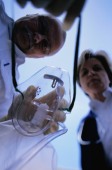Similar diagnostic yield, rate of major complications for moderate sedation, general anesthesia
WEDNESDAY, April 8, 2015 (HealthDay News) — The diagnostic yield of endobronchial ultrasound-guided transbronchial needle aspiration (EBUS-TBNA) is not influenced by the type of sedation used, according to a study published in the April 1 issue of the American Journal of Respiratory and Critical Care Medicine.
Roberto F. Casal, M.D., from the Michael E. DeBakey Veterans Affairs Medical Center in Houston, and colleagues examined whether the type of sedation influences the diagnostic yield of EBUS-TBNA. Data were included for 149 patients referred for EBUS-TBNA, of whom 75 underwent the procedure under general anesthesia (GA) and 74 under moderate sedation (MS).
The researchers found that the diagnostic yield was 70.7 percent for the GA group and 68.9 percent for the MS group (P = 0.816). Sensitivity was 98.2 and 98.1 percent in the GA and MS groups, respectively (P = 0.979). EBUS-TBNA was completed in 100 and 93.3 percent of patients in the GA and MS groups, respectively (P = 0.028). No major complications or escalation of care were seen in either group. The MS group had more minor complications (29.6 versus 5.3 percent; P < 0.001). In both groups, most patients stated that they “definitely would” undergo this procedure again (P = 0.355).
“EBUS-TBNA performed under MS results in comparable diagnostic yield, rate of major complications, and patient tolerance as under GA,” the authors write. “Future prospective multicenter studies are required to corroborate our findings.”
Full Text (subscription or payment may be required)
Copyright © 2015 HealthDay. All rights reserved.








